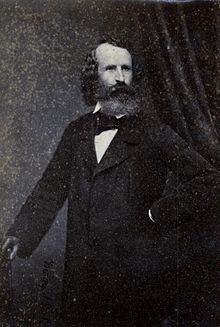William Page (painter)
| William Page | |
|---|---|
 |
|
| Born |
January 3, 1811 Albany, New York |
| Died | October 1, 1885 (aged 74) Tottenville, Staten Island |
William Page (January 3, 1811 – October 1, 1885) was an American painter and portrait artist.
He came to New York City with his parents at the age of nine, and in 1822 received a premium from the American Institute for a drawing in India ink. At the age of 14, he began to study law in the office of Frederick de Peyster, which he soon left to enter the studio of James Herring, and in less than a year he became a pupil of Samuel F. B. Morse, through whom he also enrolled at the National Academy of Design. His drawings in the antique class at the National Academy won him the silver medal, but, having joined the Presbyterian Church, he determined to enter its ministry. For two years, he studied theology at Andover and Amherst, at the end of which time he returned to art.
After painting portraits in Albany for a year, he went to New York, where he executed likenesses of William L. Marcy and John Quincy Adams. In 1836, he was elected a National Academician, and he was president of the National Academy from 1871 until 1873. About 1844 he moved to Boston, but in 1847 he returned to New York for a stay of two years.
Page then went to Italy, where he resided for eleven years in Florence and Rome, coming back to New York in 1860. While he was in Italy, he painted the portraits of Robert and Elizabeth Browning and other well-known Englishmen and Americans. He also took occasion to study the works of the great masters, notably Titian, whom he admired and emulated, and whose method of painting he strove to discover. The copies that he executed of Titian's paintings were so remarkable that one of them was seized by the Florentine authorities under the belief that it was the original. He was also a friend of William Wetmore Story and of James Russell Lowell, who dedicated his first collection of poems to him in 1843.
...
Wikipedia
